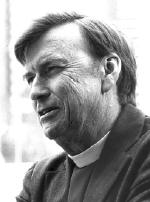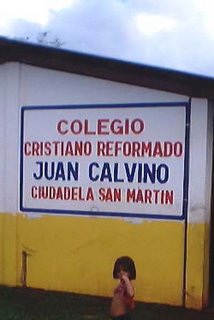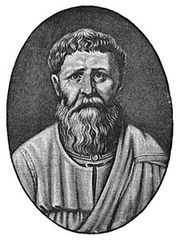This is part two of a two part interview with "Expository Thoughts" contributor Jerry Wragg. Jerry is the pastor-teacher of Grace Immanuel Bible Church in Jupiter, Florida. 7. What dead preachers inspire you? Why?Tough to be concise here…
Paul – For his tireless preaching and teaching of the whole counsel of God. It’s hard to imagine a time in history needing greater discipline than our own era, but Paul’s ministry burden, though exponentially towering above my own, never overtook his singular focus of sacrificially giving all that was required. “Night and day with tears…”---Amazing!
John Chrysostom – For the serious attention he gave to preaching for life change. It has been said of him that “he taught…like a pastor of souls.” His systematic expositions, though profound, were marked by clarity and simplicity.
John Calvin – A name that has no doubt inspired every truly thinking preacher, but one that brings sobriety to my ministry. Though Calvin privately endured unspeakable infirmities, his productivity was nonetheless staggering. Yet, his own assessment of his work is best captured by a comment to his fellow elders, “I have had much infirmity that you have had to bear, and the sum total of all that I have done has been worth nothing.” Such humility without self-pity was the reason for his usefulness.
George Whitefield, William Grimshaw, John Berridge, Henry Venn, John Wesley, and a handful of others who literally “preached” England into a reformation! These men inspire because their preaching was so thoroughly driven by the highest exaltation of Christ and the abhorrence of man-centeredness. Such unwavering preaching turned an entire darkened nation and culture upside down.
C.H. Spurgeon – For the skill (among so many he possessed) of illustrating truth from life with piercing humor and clarity, while never turning the pulpit into vaudeville. His balance along almost every theological knife-edge betrays hours of tireless meditation upon scripture. What a model!
Martyn Lloyd-Jones – For the theological depth of both his preaching and his churchmanship. Here was a pastor whose personal devotion to Christ saturated his sermons. His teaching ministry was powerful because he first took heed to himself.
8. Do you have hope that a new generation of young preachers will pick up where the old guys have left off? I truly believe that God has already been preparing and using a crop of young hearts that will stand with the greats of the past and boldly expound scripture, even to their own harm. Such men, however, must be willing to step out of the shadows and proclaim the truth against a ferocious liberalism that will not silence easily. Perhaps the true expositors of today (e.g. MacArthur, Sproul, Piper, et.al.) are God’s catalysts for a strong movement of unshakeable preachers with passion, discernment, authority, and skill.
9. What are common mistakes you see young preachers making?Regarding textual mistakes, young preachers tend to disseminate more exegetical data than are necessary for clarity. A good check and balance is to ask four simple questions:
1.) Will the passage be confusing without this particular feature?
2.) Is this information critical for settling a doctrinal matter and exposing clearly erroneous views?
3.) Is my grasp of the text thorough enough to manage and resolve further questions such information may trigger?
4.) Can I make a clear bridge between this information and the rhetorical function of the passage so that the hearers see its import?
Also, young preachers (me included, though some might dispute the “young” part) fall into a host of textual errors by letting their language skills atrophe. It helps to regularly read books on interpretation, identifying bad habits and areas of ignorance. A good book to start with is D.A. Carson’s Exegetical Fallacies.
Regarding tactical ministry mistakes, many young pastors believe they have the confidence of their flock after only a short while in the saddle. Consequently, they often attempt to change long-standing paradigms with a loaded sermon or two. It takes several years before the sheep begin to know and trust their shepherd’s voice. Young preachers, no matter how glib, must learn that it requires hundreds of expositions before a flock trusts the heart behind the message. The congregation needs time to observe how the pastor approaches each different scriptural genre, challenging doctrinal disputes, confusing ethical questions, personal struggles, ministry conflicts, and character weaknesses. Preaching effectively to a trusting flock takes several foundational years of humble service before heads will turn when you speak.
10. How much does the culture influence what you will say in a sermon?It depends upon the angle of the question. My task is to expound the mind and heart of God in each passage, carefully explaining the author’s intent and implications for both the ancient culture and today’s Christian. The moral issues of contemporary culture should not have any bearing upon a proper transliteration and interpretation of a passage’s meaning. Having discovered the author’s normative meaning and principal implications for the ancient culture, I must work to understand how each propositional truth forms a bridge of implications for God’s people today. The timelessness of some truths is obvious while others make bridge-building more intricate and challenging. In this light, a pastor must have a wise grasp of contemporary culture from three vantage points:
1.) He must know God’s character and redemptive purposes for His people which serve as a timeless framework for understanding how man should relate to God in any culture.
2.) He should regularly review and humbly acknowledge the truth about man’s sinful nature so that cultural shifts, religious or pagan, do not lead to pragmatic, man-centered, or shallow moralizing. In other words, man’s heart is the same in every era, and preaching for surface change by focusing on the trendy cultural hot-buttons may temporarily “touch” the sheep, but their appetite for such superficial “relevance” will starve them to death!
3.) He should develop critical thinking skills for demonstrating exactly how the ancient text presents contemporary implications which must be applied to one’s heart and life. Such skill comes from the direct and habitual application of truth to unbiblical thinking, motivations, affections, passions, and convictions in one’s own life first.
Many of today’s books on preaching attempt to counter poorly organized, passionless, and disconnected sermons by strongly emphasizing the contemporary side of the homiletical bridge. I agree that a properly interpreted passage without an exhortation to change is not preaching. Unfortunately, however, pastors have taken these calls for balance to mean that authorial intent and biblical culture are not our first concern. Congregations have been all too willing to champion this push to “make sermons relevant”, leaving the pastor pinched between his training and the desire to “connect”. What is the solution? Remember that building the bridge in reverse (contemporary to ancient) places the authority with contemporary man rather than with God’s revelation. Surface problems and their solutions are superimposed upon biblical truth so that God’s mind is not understood, His power not experienced, and no actual bridge for life change established. The result is sheep who scarf up a steady diet of feel-good candy which offers no real nourishment, and a pastor who spends less time harkening unto God’s truth and more energy searching for “connecting points” with contemporary culture.














